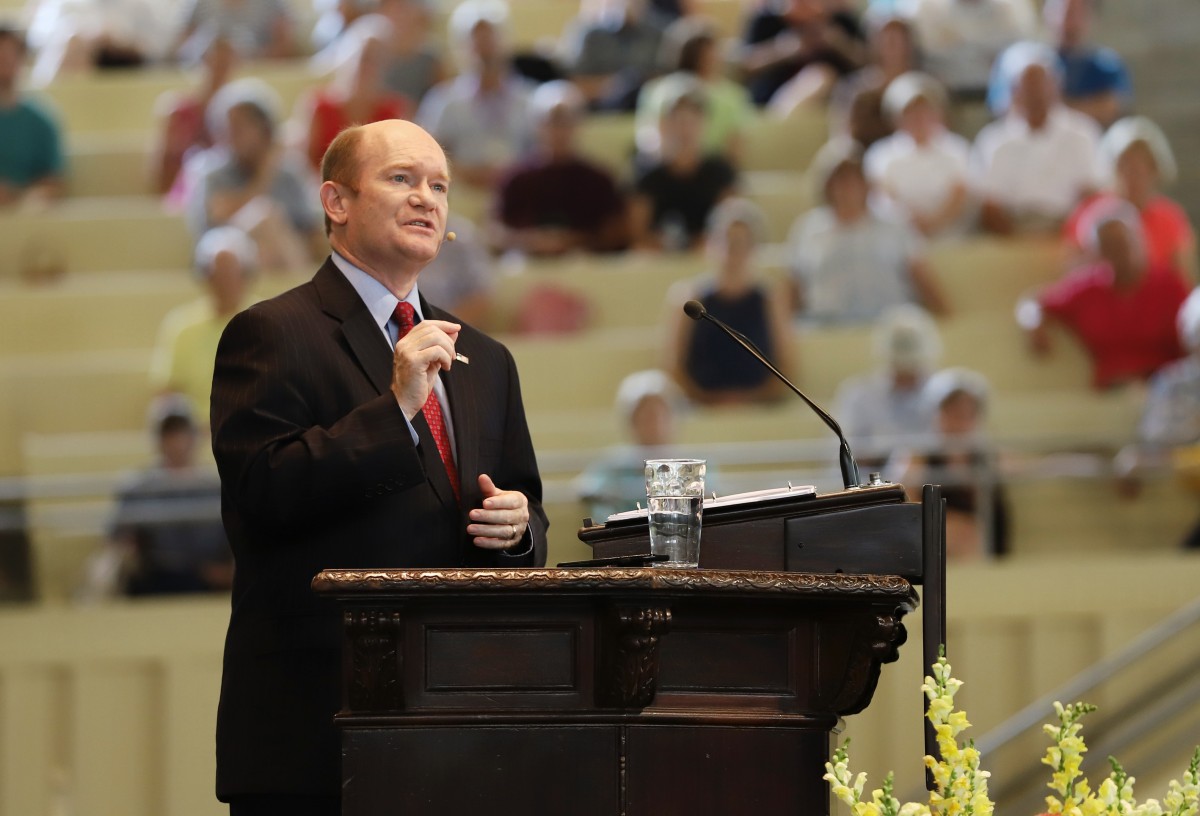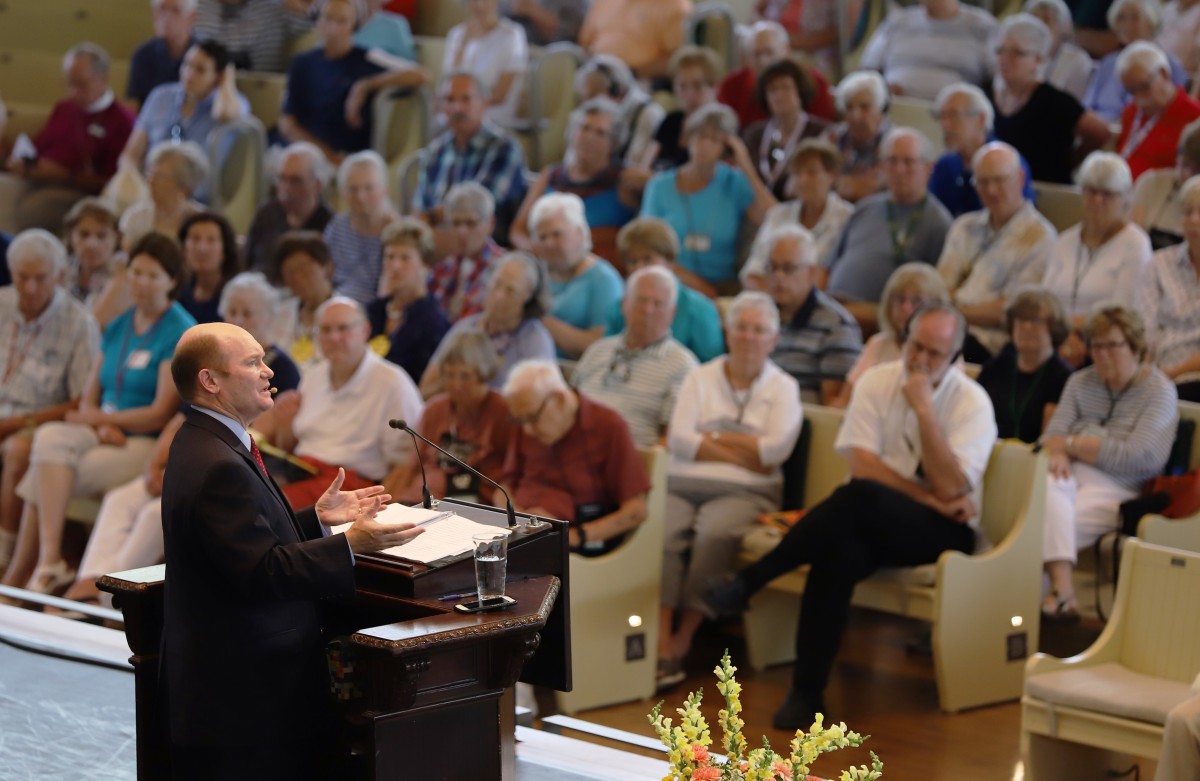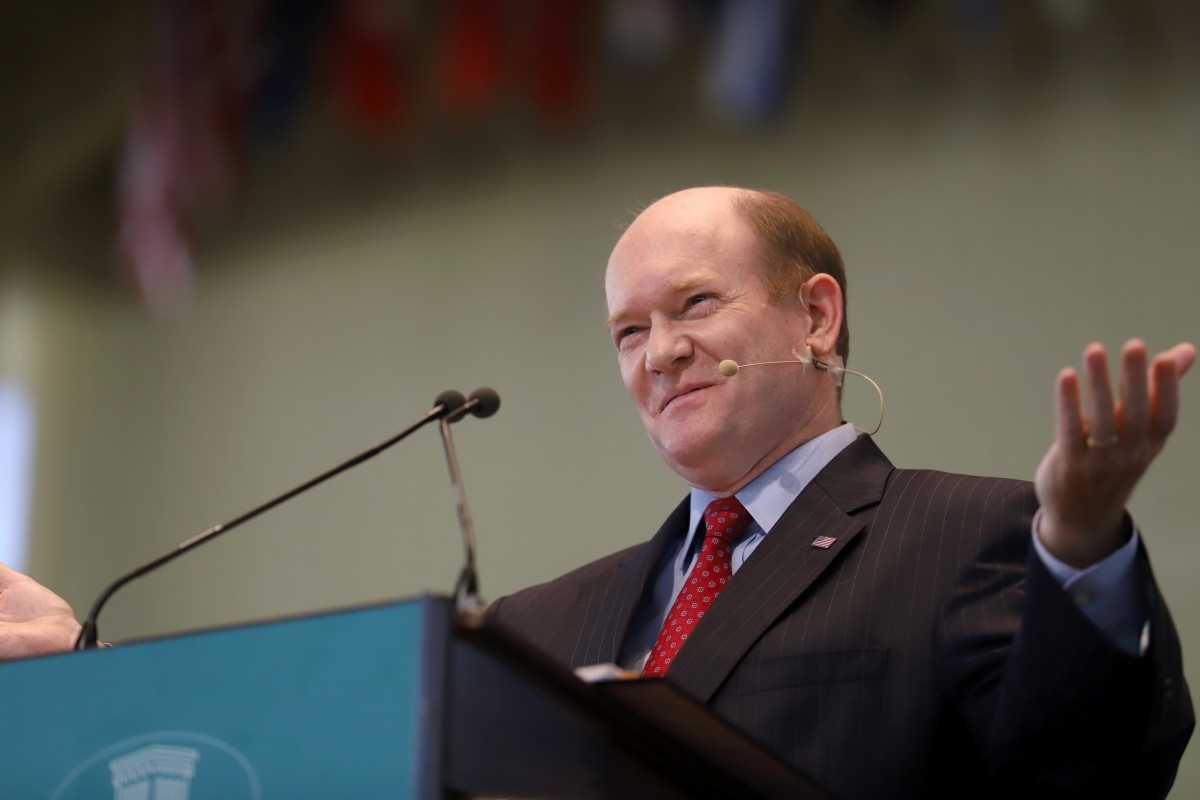In each generation there is a moment when Americans must stand and act — for Sen. Chris Coons, now is that moment.
“We have a fight on our hands,” he said to a filled Amphitheater at the 10:45 a.m. morning lecture Monday, July 16, drawing back the Iron Curtain for Chautauqua Institution’s Week Four theme, “Russia and the West.” This was Coons’ first visit to Chautauqua.
Coons said he knew he was in “a place where people listen to one another.” In other words, a place “utterly different from the United States Senate.”
Coons knows the Senate floor all too well; he was elected in 2010 as Delaware’s Democratic junior senator. He sits on the Senate Foreign Relations Committee, as well as the Appropriations, Judiciary, Small Business and Entrepreneurship and Ethics committees.
His appearance came at a critical time in the United States’ relationship with Russia; Coons’ lecture overlapped with President Donald Trump’s summit with Russian President Vladimir Putin in Helsinki, Finland, and days after the indictment of 12 Russian intelligence officers.
“I take no joy in delivering this message,” he said. “It is deeply discouraging to have to say anything that speaks ill of our president when he is outside our nation on foreign soil, but the timing of this speech and the timing of that summit were set, perhaps by providence or accident, and I think this is a time that calls for us to speak clearly about where we are (in our relationship with Russia).”
He opened his lecture, and the week, with a “stark warning.”
“The current Russian government under Vladimir Putin is a persistent danger to our democracy, to our European allies, to democracy globally,” he said. “At a time when overseas, China and North Korea, Iran and terrorism command our attention, we ignore Russia at our peril. … Only a clear eye can truly find bipartisan strategy to confront Putin’s Russia and contain it to prevent it from further damaging our society.”
Despite its looming threat, Russia is a cultural powerhouse with a rich and vast history that should be appreciated and better understood, Coons said.
“Russia is not some recent artificial, geopolitical creation, but a proud nation with a history that stretches back a millenium. … Its writers, its composers, its scientists have influenced the course of global culture, European history for centuries,” he said. “In a place like Chautauqua, where you celebrate literature, movies, music, dance, it’s worth taking a moment to consider how much Russian has contributed to human civilization.”
But its cultural renaissance cannot mask the “dark side” of Soviet Union-era labor camps, devastating famines caused by Joseph Stalin’s misuse of power and, more recently, Putin’s interference with the 2016 U.S. election, he said.
In 1993, Coons visited post-Cold War Russia, where he met with entrepreneurs “hoping to channel innovation and creativity to bring prosperity to their country and families.” The 1990s brought great political and economic instability to Russia, marked by food shortages and job loss. The hopes of its people failed to materialize, Coons said.
At the center of this mass insecurity was former Russian President Boris Yeltsin, who fought tirelessly to demolish the Russian parliament; his efforts laid the foundation for Putin’s reign.
“The sufferings of post-Cold War Russia represent a lost opportunity,” Coons said. “Economic dislocation, widespread political corruption and Yeltsin’s consolidation of power tarnished democracy and capitalism in the eyes of many Russians and prevented their nation from fully joining and benefiting from the U.S.-led international rule-based system.”
Coons experienced the country’s “sense of lost glory” during his visit, which he said facilitated Putin’s ascension to power. Putin’s promise of “law, order and a return to prestige” restored the public’s faith in their country.
Since then, Putin has declared the fall of the Soviet Union — not the Holocaust or the World Wars — as the “greatest catastrophe of the 20th century.”
With the conclusion of the Cold War came the rise of the 16-nation alliance, NATO. Since its conception, NATO has expanded to include 29 members.
“The idea was that … Russia, having lost the Cold War, would have an incentive to join the international community, perhaps even partner with NATO in the multilateral institutions we helped build following secular order,” Coons said. “The idea was that the West, led by the United States, would offer Russia real diplomatic incentives.”
At the time, U.S. foreign policy makers thought that Russia and dozens of former Soviet regimes would slowly transition to democracies with minimal support. While most former Soviet states have done so, Coons said Russia has rejected the “overtures of the West.”
“While Putin believes the United States hasn’t honored its post-Cold War pledges, Russia, too, has broken its promises,” Coons said.
The 1994 Budapest Memorandum agreed that, in exchange for giving up its nuclear weapons, the newly independent Ukraine would be safe from Russian invasion. Coons said Putin abandoned that pledge in 2014 when Russia forcely invaded Crimea and eastern Ukraine.
At the time of Coons’ 1993 trip to Russia, almost identical numbers of Democrats and Republicans reported that Russia was the United States’ greatest threat, he said. Since then, the disparity at home has grown — the percent of Democrats who believe that statement is double that of Republicans (40 percent to 20 percent, respectively). He said in the last two years, the number of Republicans who view Putin favorably has doubled, while the number of Democrats that view Putin unfavorably has risen 20 percent between 2015 and 2017.
“For those that grew up in the post-Cold War period — where school children no longer have to participate in air raid drills (or) the sense of the United States as the free world because there is a world behind the Iron Curtain — we have attitudes much less uniform, much more reflective of our attitudes of President Trump,” Coons said.
Trump is a polarizing force — with the widespread distrust of media and the echo chambers of “fake news,” Coons encouraged the audience to read the January 2017 declassified report on “Assessing Russian Activities and Intentions in Recent U.S. Elections.”
This report, according to Coons, has been endorsed by senior cabinet officials, Secretary of State Mike Pompeo and Secretary of Defense James Mattis.
“Republicans in the Senate, Democrats in the Senate, Republican senior leaders of the Trump administration have a uniform view of what is upwind. There is just one figure missing,” Coons said: Trump has refused to accept these findings.
Russia’s alleged interference in the U.S. election is not the end of its cyberattacks. The Intelligence Community assessment concluded that Russia may replicate its U.S. attack on European elections. Some European countries have already taken measures to ensure this does not happen, Coons said.
“Putin will only stop when we stop him,” he said over thunderous applause.
Coons said Congress can play a role in stopping Putin. He offered four suggestions; the first that the U.S. and European Union maintain sanctions on Russia.
Last summer, the Senate passed the Countering America’s Adversaries Through Sanctions Act 98-2, which is an array of mantorary sanctions to hold Russia accountable for its malicious actions, Coons said. Trump signed it into law, but has yet to impose those sanctions.
“Putin will only cease these actions when you impose costs on him and others for Russia’s misbehaviors,” Coons said. “The administration should fully utilize the tools Congress has given them to punish Russia.”
The second suggestion is that the U.S. must hold a “strong military posture” in Europe. Russia’s actions in Georgia and Ukraine demonstrate the need for American troops in Europe to ensure stability in the continent and among NATO allies, he said.
“An important part of our policy has to be convincing our NATO allies to invest more in our common defense — President Trump is right on this issue,” Coons said. “I may wish that he went about making demands of our allies in a different way, maybe a more private way, but he is absolutely right.”
Coons is referring to the president’s July 9 tweets:
“The United States is spending far more on NATO than any other Country. This is not fair, nor is it acceptable. While these countries have been increasing their contributions since I took office, they must do much more. Germany is at 1%, the U.S. is at 4%, and NATO benefits Europe far more than it does the U.S. By some accounts, the U.S. is paying for 90% of NATO, with many countries nowhere close to their 2% commitment …”
Coons acknowledged Trump’s success in encouraging allies to raise NATO’s budget, as well as increasing troops, but he chastised Trump for not fully recognizing the increases that have been made, and the 1,044 non-American troops fighting with the U.S. in Afghanistan.
“And while it is right to press our allies to invest more in their security and our common defense, it is wrong to mistake them as free-loading on our generosity,” he said.
His third suggestion requires Congress to hold social media corporations responsible for accounts run by Russian “bots.”
“We invented Facebook and Twitter and Reddit and Snapchat and all this stuff, and yet we allow it, with virtually no accountability whatsoever, to be used as a tool to mislead and undermine our own citizens as they vote,” Coons said.
Coons described his interaction with Mark Zuckerberg, CEO of Facebook. Coons asked why the company did not flag “a paid political advertisement, bought in Moscow and paid for in rubles.” Zuckerberg responded, “Senator we didn’t know those details.”
“Are you kidding me?” Coons said over a roar of laughter. “You know whether I’ve met my daily step goal.”
Coons also stressed the importance of free, independent journalism in the United States and worldwide.
“We ourselves, as citizens, have to do a better job of discerning real news from ‘fake news’ and educating our families and social circles about the difference,” he said.
Finally, he pushed the need for the U.S. to defend human rights — “Do you remember when that was the first principle of our foreign policy?” Coons asked.
In February, Coons joined Florida Sen. Marco Rubio in an effort to rename the street in front of the Russian embassy in Washington, D.C., after Boris Nemtsov. Nemtsov was a Russian physicist, liberal politician and outspoken critic of Putin until 2015, when he was assassinated.
“I took this action with Sen. Rubio to give a voice to someone Putin tried to silence,” Coons said, “and it is my hope that someday, Russian diplomats that travel in and out of their embassy in Washington, representing a future Russian government, will be proud to walk alongside a street named for Boris Nemtsov.”
Coons said the relationship between Russia and the West, while fraught with division, has the potential to be one of collaboration.
“During the Cold War, we were prepared to go to war at a moment’s notice, and nearly did on several occasions ” he said. “Yet at the same time we negotiated cultural, scientific and nuclear agreements with that enemy with who we were prepared to fight at moment’s notice — the Soviet Union. We found the areas of real and deep and meaningful cooperation, despite the tension between us. There is no reason why we cannot do the same today.”
Coons said the United States needs Russia’s collaboration in combating global warming, conflict in North Korea and Iran, and international terrorism.
“Yet if we fail to recognize the reality of strategic confrontation under Putin, if we abandon our willingness to fight for our values, we will never achieve lasting cooperation based on anything other than a Russian tactical effort to gain short-term advantage over us,” he said. “… Our democratic world is at greater risk today than at any other time in my life, and I am certain it is worth fighting for.”
After the conclusion of Coons’ lecture, Institution President Michael E. Hill opened the Q-and-A with Putin’s statement from the Helsinki summit about the alleged interference in the 2016 U.S. election.
“The Russian state has never interfered and is not going to interfere into internal American affairs including election processes,” Hill read over gasps from the audience.
Hill summarized Putin’s suggestion that Russia and the U.S. examine any issues together in a “joint working group on cybersecurity.”
As the laughs and shock died down from the crowd, Hill asked if there is a pathway of joint engagement between the United States and Russia.
“I think it is possible, if we are strong and determined and clear-eyed in joining with our allies, to say on these key issues — sanctions for invading and occupying Crimea, interference in our election — we will oppose (Russia),” Coons said. “But if (Russia is) willing to step back from those actions and honor (its) commitments … we are willing to then work with (Russia).”
Hill turned to the audience for questions. One attendee asked if there will ever be a liberal democracy in Russia.
“Given the sophistication and complexity of (Russia’s) culture, given the determination of its journalists and its human rights activists and given the possibilities of the human spirit — which Chautauqua is all about celebrating — I can believe in the dream of a democratic Russia,” Coons said. “I am not optimistic about its achievement in the short-term.”
Finally, to close the lecture, an attendee asked to how to keep high ideals and moral standards in a democracy at a time when it seems like they are lacking.
“Know who you are, know your history,” Coons said.







